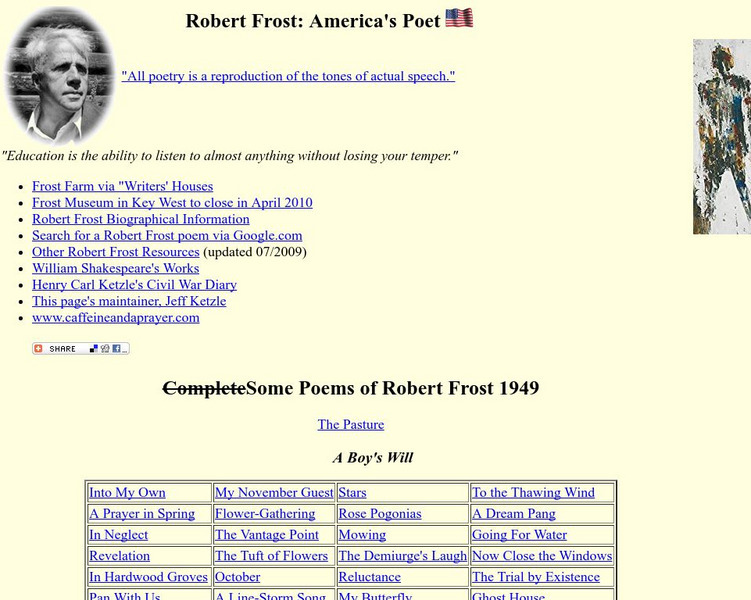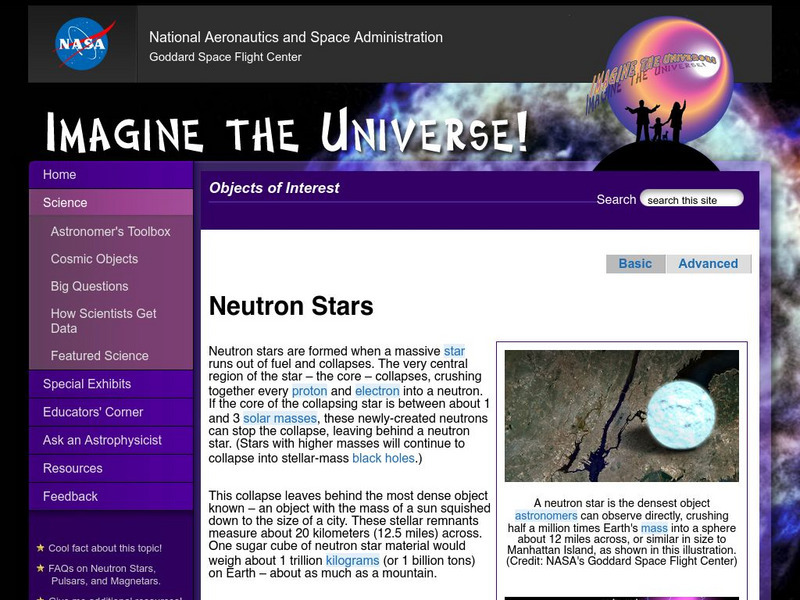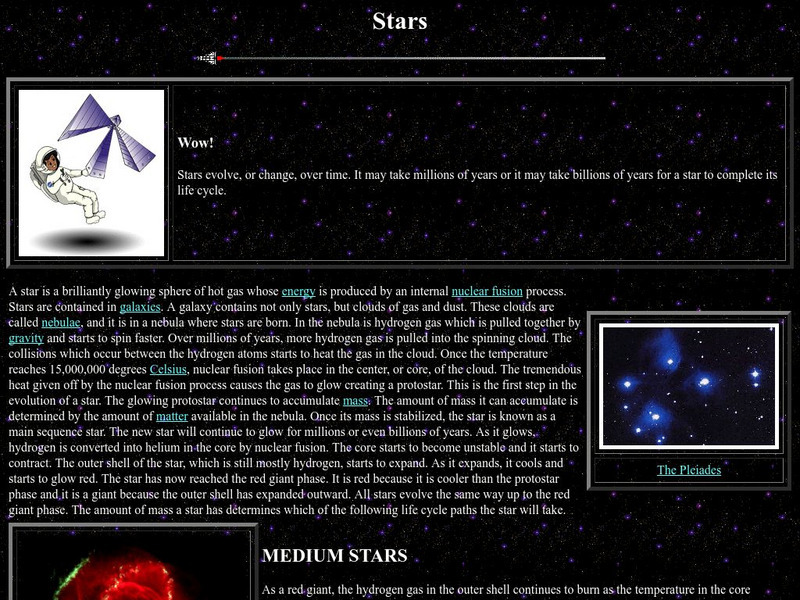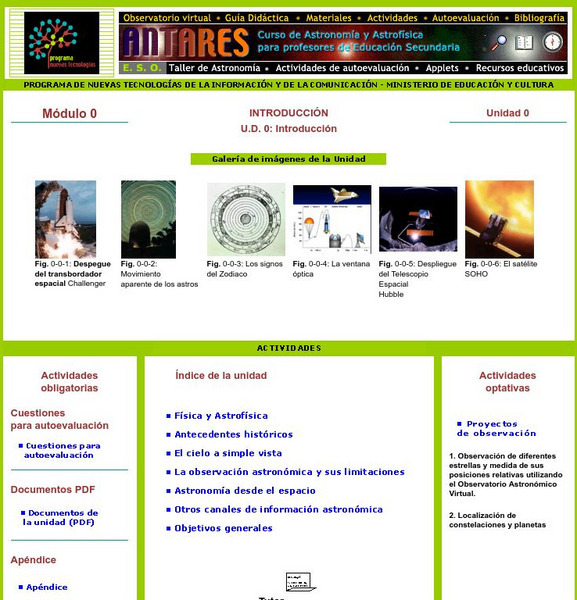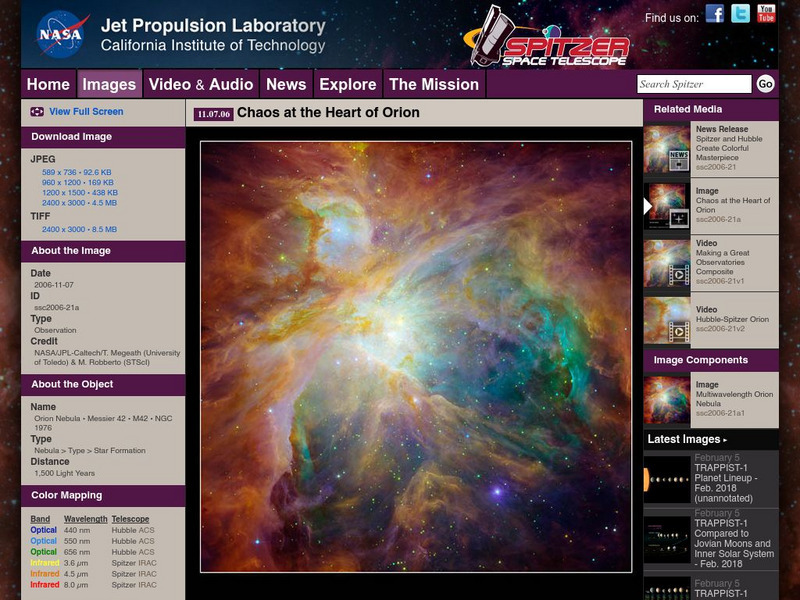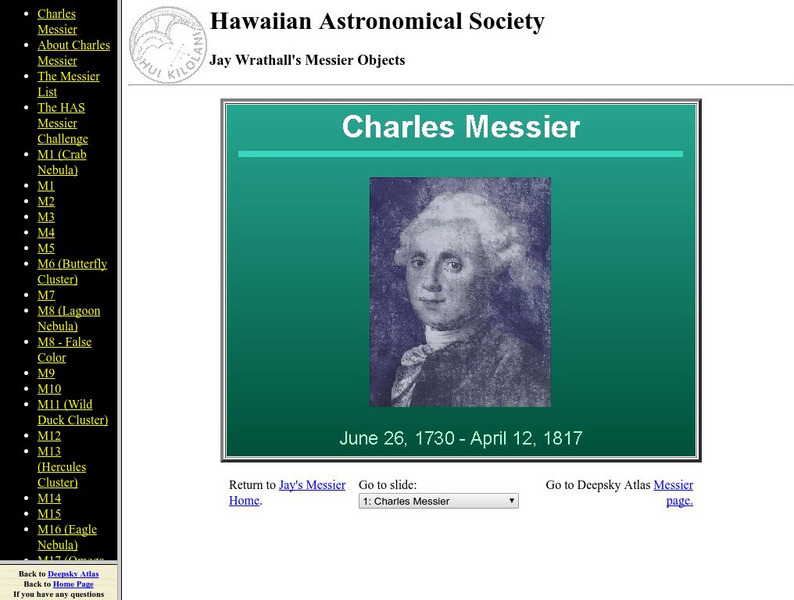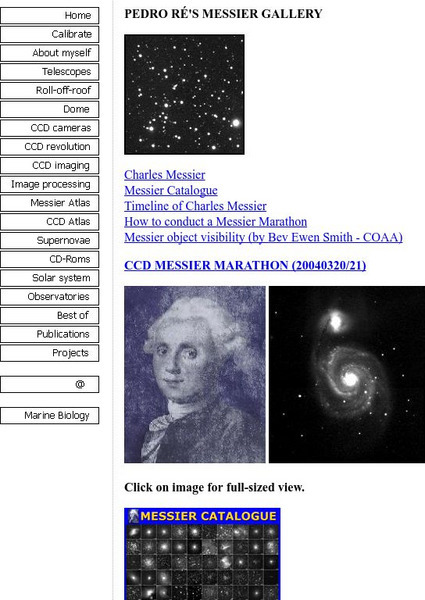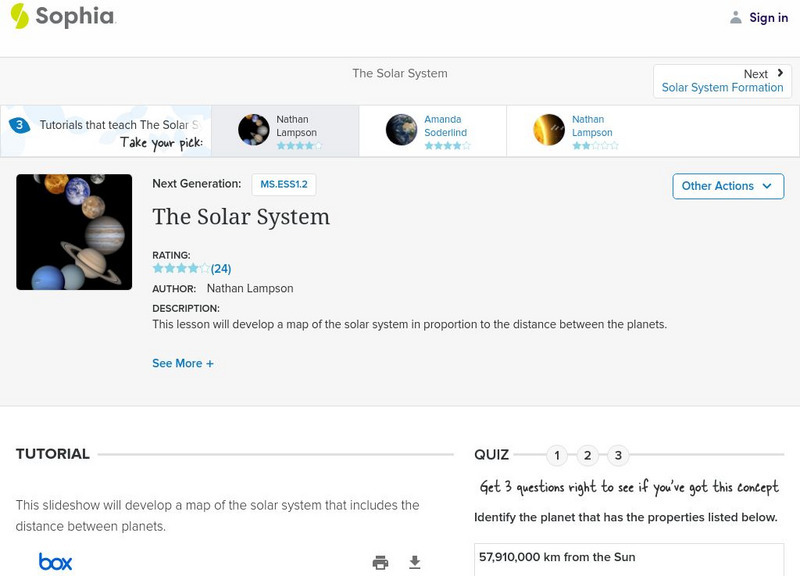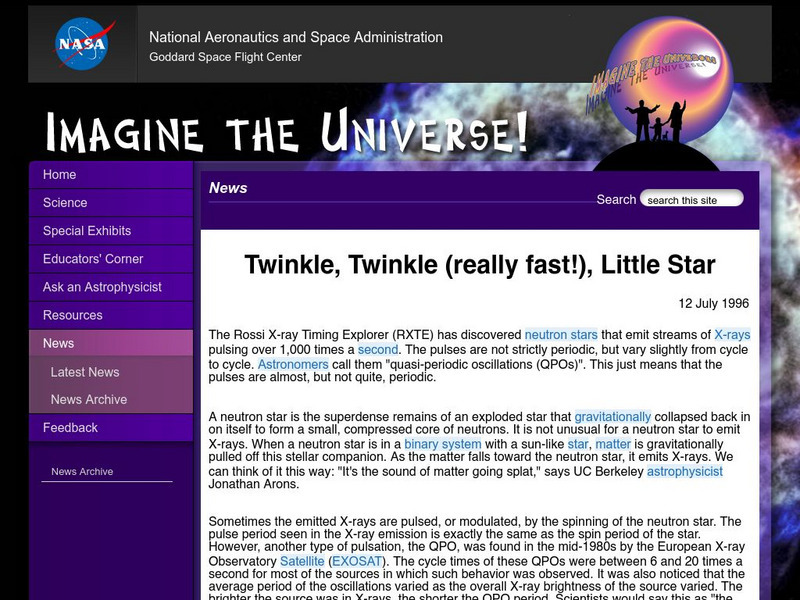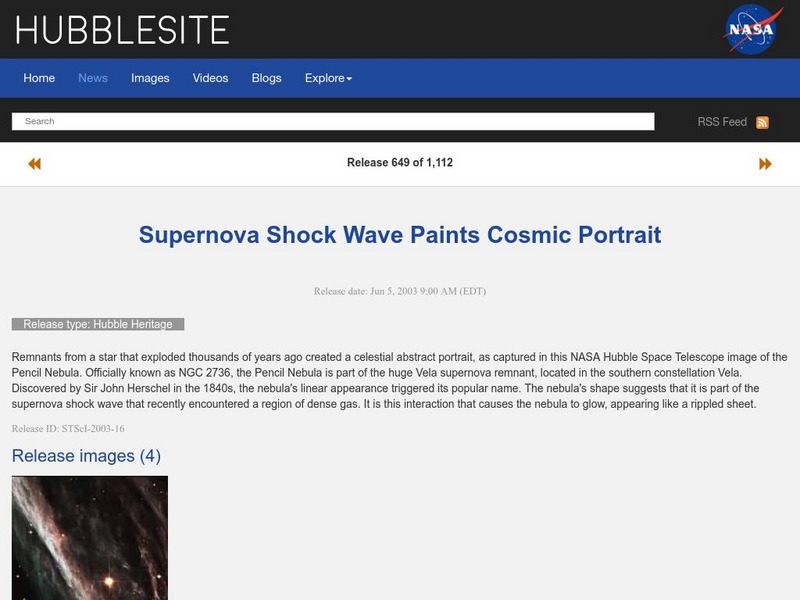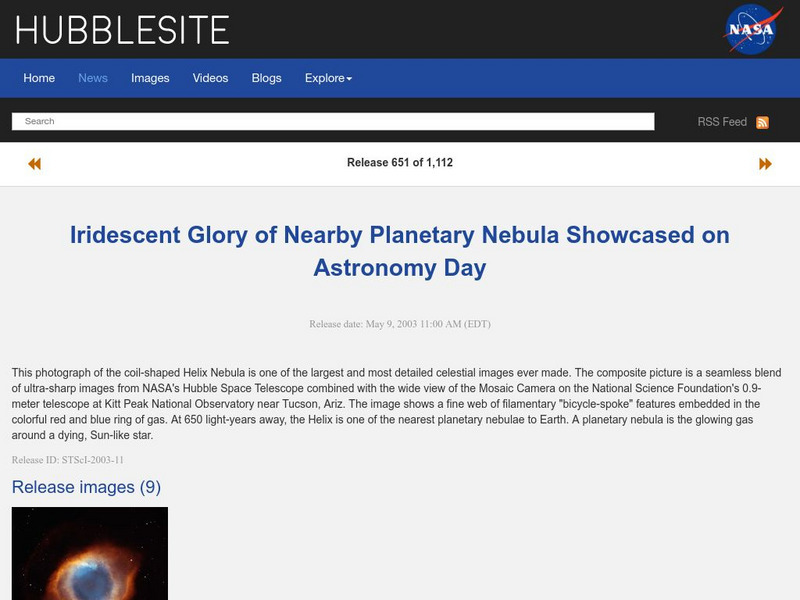Hi, what do you want to do?
Other
Robert Frost: America's Poet
This site provides many full text poems by Robert Frost. There are also multiple links for more information on Frost and his works.
NASA
Nasa: Imagine the Universe: Neutron Stars and Pulsars
Discover what neutron stars and pulsars are and view pictures of them. Includes links to additional resources and lesson plans.
California Institute of Technology
Spitzer Science Center: Red Giant Image
This image features two views of the "bow shock" of a dying star in the Hydra Constellation. The text below the image proceeds to explain a "bow shock" in relation to the red giant star pictured.
California Institute of Technology
Spitzer Science Center: Crab Nebula
This image, titled "Crab Nebula Supernova Remnant" features the Crab Nebula which was noted in the constellation of Taurus by Chinese astronomers. The text under the image details various specifics about the picture.
NASA
Nasa Star Child: Stars (Level 2)
This NASA site that explains the notable features of stars and constellations, including medium and massive stars. Many terms are clickable links to definitions. There is also a link to the Level 1 version of this site, which is written...
National Endowment for the Humanities
Neh: Edsit Ement: Galileo: Revealing the Universe
In this lesson plan, students will consider "Galileo: Revealing the Universe." The plan includes worksheets and other student materials that can be found under the resource tab.
Ministerio de Educación (Spain)
Ministerio De Educacion: Introduccion Modulo 0
Observe different stars and measure its relative position utilizing the Virtual Astronomical Observatory.
PBS
Pbs Nova: Hunt for Alien Worlds
Ever wonder if we are alone in the Universe? How are scientists searching for alien life? Learn the answers to these questions and find out about other solar systems.
University Corporation for Atmospheric Research
Ucar: High Alt. Observatory: Nicolaus Copernicus (1473 1543)
This site contains a short biography of Copernicus.
Other
Astromador: Astronomia Para Amadores
This resources focuses exclusively on astronomy. It's packed with historical facts about space exploration, famous people who pioneered the study of stars and planets. It features chronological list of space exploration, current news,...
Famous Scientists
Famous Scientists: Tycho Brahe
Learn about this 16th century astronomer who was known for his accurate and comprehensive astronomical and planetary observations.
American Museum of Natural History
American Museum of Natural History: Carl Sagan and the Quest for Life in the Universe
A brief biography of American astronomer and science advocate Carl Sagan.
Other
Astro Mia: Tierra, Sistema Solar Y Universo
This site is a good resource to study Astronomy. It has six sessions: the Universe, the solar system, the earth and the moon, history of Astronomy, articles, famous astrologers and a glossary.
Utah STEM Foundation
Utah Stem Action Center: Together We Can Rule the Galaxy
In this lesson, students will learn about Galileo Galilei and space.
California Institute of Technology
Spitzer Science Center: Heart of Orion
Under the picture titled "Chaos at the Heart of Orion" this site explains in detail the various features of the image displaying the Orion Nebula.
US Navy
Naval Historical Center: Quasi War With France
A brief explanation of the role the newly developed Navy played in the Quasi-War.
Other
Has: Charles Messier
Brief, concise facts about Charles Messier and his catalog of comets, galaxies, and other astronomical bodies. Included are photographs of each of the 110 objects listed in his catalog.
Other
Pedro Re's Messier Gallery
Are you looking for information on Charles Messier? This site includes a detailed biography of his life along with a timeline, how to conduct a Messier Marathon, and photographs of the astronomical objects in Messier's catalog.
Sophia Learning
Sophia: The Solar System: Lesson 1
This lesson will develop a map of the solar system in proportion to the distance between the planets. It is 1 of 3 in the series titled "The Solar System."
NASA
Nasa: Make Star Cookies
This site from the National Aeronautics and Space Administration provides a fun project on stars and cookies. "Make these yummy star cookies with genuine star-colored centers you can see through." Plus, learn interesting facts about...
NASA
Nasa: Imagine the Universe: "Twinkle, Twinkle (Really Fast!), Little Star"
"The Rossi X-ray Timing Explorer has discovered neutron stars that emit streams of X-rays pulsing over 1,000 times a second." Visit this site to read the rest of this article. Site offers additional resources as well as a Teacher's Corner.
NASA
Nasa: Imagine the Universe: X Ray Binary Stars
Site provides a brief introduction to binary stars. Additional resources for students and teachers on this topic are offered as well as related topics.
Space Telescope Science Institute
Hubble Site: Supernova Shock Wave
This site from the Hubblesite highlights an article written about a supernova shock wave. Provides images as well as video footage. Site offers links to fast facts, a question and answer section as well as related links.
Space Telescope Science Institute
Hubble Site: Planetary Nebula
This site from Hubblesite provides a brief news article as well as colorful pictures of a nearby Planetary Nebula. Offers links to images, video, fast facts, a question and answer section as well as related links.
Other popular searches
- Stars and Constellations
- Patterns of Constellations
- Star Constellations
- Greek Constellations
- Constellations Activity
- Solar System Constellations
- Constellations of the Zodiac
- Constellations Science
- Constellations Space
- Stars, Constellations
- Space and Constellations
- Constellations Word Search





